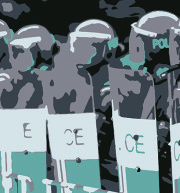
The Special Rapporteur’s factsheet summarizing fundamentalism and its impact on the rights to freedom of peaceful assembly and of association, presented in an easy-to use “yes/no” format, with hyperlinks to source materials. The factsheet also addresses the related but distinct phenomenon of "extremism" and how assembly and association rights can help stem its spread. This factsheet draws from the Special Rapporteur’s 2016 report to the UN Human Rights Council and features guidance on: • The definition of various "fundamentalisms," including market fundamentalism, political fundamentalism, religious fundamentalism and national/cultural fundamentalism • How fundamentalism can motivate violations of the rights to freedom of peaceful assembly and of association • States' responsibility to prevent the negative impacts of fundamentalism on the enjoyment of assembly and association rights (including their duty to prevent abuses of these rights by non-State actors) • Examples of fundamentalism drawn from the report • Selected recommendations from the report • And more For the Special Rapporteur’s full factsheet series, please see:... Continue reading →

In recent years, there has been a perceived rise in the expression of fundamentalism in many contexts across the world. Despite the frequent use of the term, “fundamentalism” remains a word that is rarely defined with any specificity. Common use generally centers on religious fundamentalism, and this is perhaps what comes to mind first for most people. But fundamentalism can encompass much more than religion, and in this report the Special Rapporteur takes a much broader view of the term. He believes that fundamentalism can and should be defined more expansively, to include any movements – not simply religious ones – that advocate strict and literal adherence to a set of basic beliefs or principles. Adherence to the principles of free market capitalism, for example, has spawned what has been called “market fundamentalism.” And the unbending belief in the superiority of one ethnic group, race, tribe or nationality can lead to what might be called “nationalist fundamentalism.” Numerous other examples are detailed in this report. This report is not concerned with fundamentalist viewpoints per se, but rather with fundamentalism in action: concrete, specific violations of the rights to freedom of peaceful assembly and of association that are motivated by these viewpoints. The mere voluntary... Continue reading →

Issue No. 19 of the Assembly and Association Briefing, the newsletter of Maina Kiai, UN Special Rapporteur on the rights to freedom of peaceful assembly and of association. In this issue: • UN rapporteurs provide a roadmap to avoid human rights violations during protests • Human rights defender Berta Cáceres murdered in Honduras; Gustavo Castro Soto remains at risk • UN experts urge Western Australia not to pass anti-protest law • #FOAAat50: Celebrating 50 years of human rights through art and social media • Follow-up visit to the United Kingdom in April 2016 • Next UN General Assembly report to focus on labor issues • Freedom of association and assembly: By the numbers • Special Rapporteur news in brief: February – March 2016 • World briefing: Freedom of assembly and association in the news For a link to the newsletter, click on the image at right or click here (1.9MB file) or here (5.9MB full resolution file). To subscribe to our newsletter, please drop us a line at info@freeassembly.net with the subject line “subscribe to newsletter.” For other recent newsletters, see the links below: The Assembly and Association Briefing, Vol. 2, No. 7 (Issue 16) (Oct. 2015) The Assembly and Association Briefing, Vol. 2, No. 8 (Issue 17) (Nov.-Dec.... Continue reading →

The Special Rapporteur’s factsheet summarizing his joint 2016 report with fellow mandate holder Christof Heyns, which outlined a series of practical recommendations for the proper management of assemblies. The report was developed based on consultations with over 100 experts and more than 50 UN Member States. This factsheet draws heavily on the report and answers a number of questions regarding the management of assemblies, including: • Do assembly participants forfeit all of their rights if they are not peaceful? • Do human rights protections apply to everyone participating in an assembly? • Do States have a positive obligation to facilitate assemblies? • Should states require demonstrators to obtain prior permission for assemblies? • Can firearms be used to disperse a violent assembly? • Is there a right to observe, monitor and record assemblies? • Does the right to privacy apply in the context of assemblies? • Do businesses have a duty to respect rights in the context of assemblies? For the Special Rapporteur’s full factsheet series, please see:... Continue reading →

GENEVA – Two United Nations human rights experts presented today a new report to the UN Human Rights Council offering extensive recommendations to States and police forces around the world on how best to manage public gatherings. “The proper management of assemblies can in many cases serve to prevent an escalation of the situation and the eventual outbreak of violence. We believe that proper precautions and preparations can help to protect the rights of all concerned - the demonstrators, bystanders and the police,” said the Special Rapporteur on extrajudicial, summary or arbitrary executions, Christof Heyns, and the Special Rapporteur on the rights to freedom of peaceful assembly and of association, Maina Kiai. The report is the result of consultations with more than 50 States and 100 experts from civil society, academia, protest groups, national human rights institutions and police forces. “Our many conversations with States and experts confirmed that the ability to meet and act collectively is vital to democratic development and to the expression of ideas,” Mr. Kiai said. “Human rights are often violated in the context of assemblies, sometimes unintentionally. These recommendations are aimed at providing all involved with a common frame of reference of how this world-wide form of... Continue reading →

GENEVA – Special Rapporteur on extrajudicial, summary or arbitrary executions, Christof Heyns, and Special Rapporteur on the rights to freedom of peaceful assembly and of association, Maina Kiai, will appear before the Human Rights Council on 9 March 2016 at 1:30 p.m. (Geneva time) to present their joint report on the proper management of assemblies. The presentation and interactive dialogue will be broadcast live on http://webtv.un.org/ The report summarises applicable international legal standards, and offers practical recommendations to States on how these principles might be implemented. The report has been drafted pursuant to a request from the Council in resolution 25/38. In developing the recommendations, the Special Rapporteurs consulted widely through a written questionnaire and in-person meetings with over 50 Member States, and with over 100 experts, drawn from academia, civil society, protest movements, and National Human Rights Institutions. “Our many conversations with States and experts confirmed that the ability to meet and act collectively is vital to democratic development and to the expression of ideas,” Mr. Kiai said. “It also confirmed that basic human rights are routinely violated in the context of assemblies. These recommendations provide a roadmap on how to avoid... Continue reading →

The ability to assemble and act collectively is vital to democratic, economic, social and personal development, to the expression of ideas and to fostering engaged citizenry. Assemblies can make a positive contribution to the development of democratic systems and, alongside elections, play a fundamental role in public participation, holding governments accountable and expressing the will of the people as part of the democratic processes. Yet despite the increasingly prominent role that assemblies play in today's world, there remains a lack of clear understanding of the applicable international human rights law and standards. When can a State require advance notification of an assembly, for example? Can authorities place limits on the time, place or manner that protests are conducted? What are the State's duties in terms of facilitating assemblies? In March 2014, the Human Rights Council requested Special Rapporteurs Maina Kiai and Christof Heyns to help answer those questions and more. This report is the result of their work - a compilation of practical recommendations for the proper management of assemblies based on consultations with over 100 experts and more than 50 UN Member States. Written input was also solicited via questionnaires. “Assemblies are not a novel phenomenon – people taking to... Continue reading →

For his next report to the Human Rights Council in June 2016, Special Rapporteur Maina Kiai will explore the subject of fundamentalism and the intolerance that it can spur, leading to violations of the rights to freedom of peaceful assembly and of association. The contours of this subject, however, are not necessarily what they might seem at first glance. The term “fundamentalism” lacks a formal academic or legal definition, but for many people it can be a loaded term, implying religious extremism or terrorism. These connotations only capture a small part of the story. For this report, the Special Rapporteur will be approaching the subject of fundamentalism from a different, and much broader, perspective. He believes that fundamentalism encompasses strict adherence to the principles of any given subject, discipline or ideology – not just religion. It also frequently implies intolerance of other views. The purpose of the report is not to make a judgment on whether fundamentalism is good or bad, but to look at its often detrimental impact on the realization of freedoms of peaceful assembly and association. Thus, the report will also explore other variations of fundamentalism, some of which may not traditionally be viewed as fundamentalism at all: market fundamentalism, nationalist... Continue reading →

GENEVA – The United Nations Special Rapporteur on the rights to freedom of peaceful assembly and of association, Maina Kiai, called for a new treaty binding businesses to respect fundamental human rights, and for States and corporations to fully engage with civil society organizations in the context of natural resource exploitation. “Corporations play an outsized role in the decision-making processes about exploitation of natural resources. But they are not subject to legally binding human rights obligations,” Mr. Kiai told the UN Human Rights Council during the presentation of his latest report. “It is time to address this issue more robustly; corporations must not escape responsibility to safeguard human rights.” In response to these concerns, the Special Rapporteur called upon States to enact a legally binding human rights instrument that applies to all corporations, regardless of their size or geographical scope. “I am aware that some would rather strengthen compliance with the Guiding Principles than have a binding treaty. But this should not be an either/or matter: Both should be pursued to protect human rights.” The Special Rapporteur also highlighted States’ responsibility to recognize civil society organizations, including affected communities, as key actors in the... Continue reading →

The Special Rapporteur’s factsheet summarizing his official visit to Kazakhstan in January 2015 highlights issues surrounding the rights to freedom of peaceful assembly and of association and is presented in an easy-to use “yes/no” format, with hyperlinks to source materials. This factsheet draws heavily from the Special Rapporteur’s report on the Kazakhstan visit, which was presented to the Human Rights Council in June 2015. It provides details and analysis of: • The authorization process for peaceful assemblies in Kazakhstan • The registration of associations, and the Government’s role in regulating the civil society sector • Difficulties faced by political parties and religious associations • The Special Rapporteur’s findings and recommendations • A note on an "disturbing surveillance incident in Aktau" • The Government of Kazakhstan's response to the report • And more The factsheet also gives background information on Kazakhstan, including vital statistics and its “scorecard” on ratifying key UN human rights treaties. For the Special Rapporteur’s full factsheet series, please see:... Continue reading →